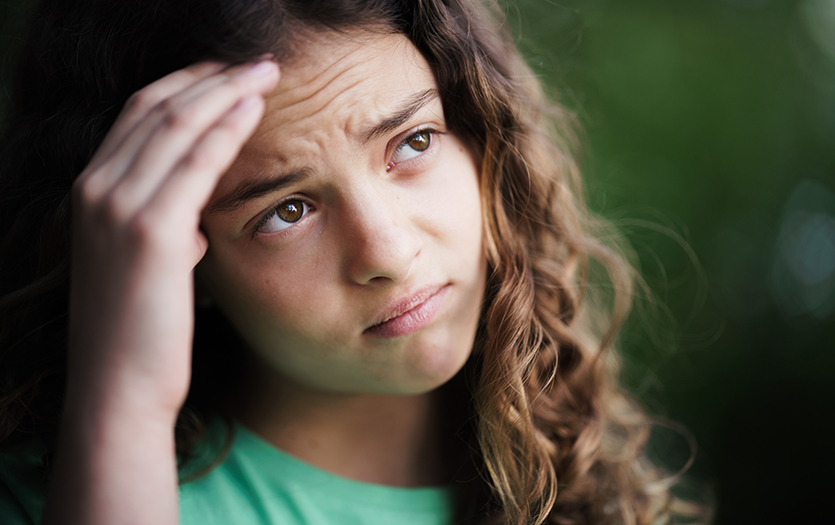
This post was written by Rylie Ousley, NP, PPG - Pediatric Specialties, Neurology.
Headaches are a common complaint of children and teens, and most of the time, they are nothing to worry about. This blog post can help parents be prepared with the knowledge of common types of headaches, what symptoms or scenarios need a doctor’s attention, and how to treat them in order to give you child some relief.
What causes headaches in kids?
Most often, we see headaches in kids caused by poor sleep habits, decreased water intake, poor diet, overuse of electronics, stress and vision issues. Less often we find something structural through imaging.
What are common types of headaches?
The most common types of headaches include migraines, tension headaches, cluster headaches and occipital headaches.
- Migraine headaches are throbbing headaches that can last from 4-72 hours and are usually located on only one side of the head. Migraines can be trigged by certain foods, smells or other factors. These headaches may cause nausea and vomiting, and light often makes the pain worse. Some people have an aura, like seeing waves or flashing lights, which may happen shortly before or during the headache.
- Tension headaches are the most common type of headache and cause aching, tightness, pressure and pain around the forehead, temples or back of the head and neck. They then to happen again and again, especially if you are under stress.
- Cluster headaches are recurring headaches that occur in groups of cycles. These headaches appear suddenly and cause severe, debilitating pain on one side of the head, along with a watery eye and nasal congestion on the affected side of the head.
- Occipital headaches are caused by occipital neuralgia, a headache disorder where the occipital nerves that run through your scalp become inflamed. They cause a stinging or burning sensation on your scalp or behind your eye.
What headache symptoms should parents look for?
If your child is complaining of a headache, it’s important to look for other symptoms beyond the pain in their head, which could include light sensitivity, sound sensitivity, nausea, vomiting and/or dizziness.
What are ways to relieve a child’s headache?
When your child has a headache, we recommend that they rest in a dark, quiet room. Sometimes a cool rag on their head or a bath can help. If needed, they could take an over-the-counter medication like Tylenol or ibuprofen, however, we don’t recommend this as the first line of defense. If your child is given medicine too often they are at risk of developing rebound headaches, which are chronic headaches that reoccur every time the medicine wears off, prompting them to want to take more medicine.
Are there ways to prevent headaches in children?
There are several steps you can take to reduce the risk of headaches in your child. These include:
- Decreasing their electronics usage—shut down all electronics at least an hour before bed.
- Encouraging them to get outside to play for some vitamin D and fresh air.
- Maintaining a regular sleep schedule and routine even through the summer and weekends.
- Offering water frequently throughout the day.
Should I keep a headache diary for my child?
If your child is having frequent headaches, it’s a good idea to start a headache diary to bring to his or her doctor’s appointments. A headache diary can help identify certain triggers that may be causing their headaches. To keep a headache diary, start writing down:
- What your child eats and drinks.
- What type of exercises your child does and when.
- The overall state of your child’s health.
- What the weather is like (hot or cold, rainy, etc.)
- Other things that might affect your child’s headaches, such as strong feelings or stressful events.
- When your child gets a headache and how bad it is.
- What medicine you give to your child when they get a headache, and how well it works.
When should I call the doctor for my child’s headache?
Most of your child’s headaches can be managed at home. However, if they are experiencing any of these symptoms, you should call your doctor.
- If the headache has not let up in intensity for over 24 hours.
- If your child has vision loss or impaired mobility.
- If your child has headaches upon awakening.
If you need help finding a pediatrician or family doctor, our Access Center can help! Call (877) PPG-TODAY or (877) 774-8632 for assistance.



